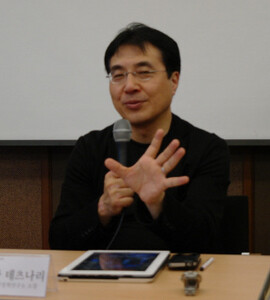hankyoreh
Links to other country sites 다른 나라 사이트 링크
[Interview] The need for natural energy development
Korea going backwards on nuclear power, says Japanese activist and author

By Han Sung-dong, senior staff writer
South Korea and Japan may have some things in common, but the two countries are going in very different directions on nuclear power. These differences were expressed by Iida Tetsunari, 53, a Japanese anti-nuclear, eco-energy activist at a special lecture organized by Greenfund in Seoul, on May 10. Iida, the executive director of the Institute of Sustainable Energy policies, Japanese non-profit civic group, has a background in nuclear engineering.
“The Fukushima nuclear accident in March 2011 provided momentum for irreversible changes in Japan. Before the disaster, the Japanese were not aware of the dangers of nuclear energy. The government and the electricity companies also were blind to the possibility of nuclear disaster,” he said.
“But now we know what happened. With the daily fear of Cesium and other radioactive materials being leaked and radio-contaminated water flowing in to Tokyo bay, the residents cannot get the incident off their minds. Even the news media has changed their stance. They barely criticized nuclear power generation or the electric companies before the Disaster. But now they don‘t hesitate to be critical. Long-term agreement to decommission the nuclear power plants will be kept.”
On the feelings of the Korean public, he said “Despite Korea’s increased awareness of nuclear energy since the Fukushima accident, it still feels how Japan did before March 2011.”
He said, “Because simple activities to oppose nuclear power cannot on their own stop the construction of nuclear plants, there is a need for the power of money which dominates the market economy.” For example, if a nuclear accident occurs in Korea, China or Japan and causes damage across national boundaries, regardless of nationality, the victims should seek responsibility from energy companies and nuclear fuel manufacturers.
In particular, Lida questioned the safety of used nuclear fuel rods, which need to be managed for over 10,000 years, and insisted that there is a need to show that massive compensation payments could bring the nuclear power companies to bankruptcy.
Iida gained the nickname ‘Mr. Energy Shift’ after recently publishing ‘Energy Evolution Theory’ own book emphasizing the need for a shift to natural energy. He predicted an increase in Japanese use of natural energy, thanks to new energy policy implemented from July.
“Japan experiencing the failure of RPS (Renewable Portfolio Standard), is shifting to FIT (Feed-in tariff), but Korea is going backwards. Korea must be the only country which has gone the opposite way,” he added.
FIT requires the electricity supply companies to buy eco-friendly generated energy at a fixed price. It has significantly increased natural energy generation and nuclear power plant decommissioning. It was originally introduced in Europe. Japan, who was once in a leading position in the field of natural energy, is applying FIT based on the previous failure of RPS, is receiving various positive results nowadays.
Translated by Lee Choon-geun, Hankyoreh English intern
Please direct questions or comments to [english@hani.co.kr]
Editorial・opinion
![[Guest essay] The real reason Korea’s new right wants to dub Rhee a founding father [Guest essay] The real reason Korea’s new right wants to dub Rhee a founding father](https://flexible.img.hani.co.kr/flexible/normal/500/300/imgdb/original/2024/0423/8317138574257878.jpg) [Guest essay] The real reason Korea’s new right wants to dub Rhee a founding father
[Guest essay] The real reason Korea’s new right wants to dub Rhee a founding father![[Column] ‘Choson’: Is it time we start referring to N. Korea in its own terms? [Column] ‘Choson’: Is it time we start referring to N. Korea in its own terms?](https://flexible.img.hani.co.kr/flexible/normal/500/300/imgdb/original/2024/0423/3617138579390322.jpg) [Column] ‘Choson’: Is it time we start referring to N. Korea in its own terms?
[Column] ‘Choson’: Is it time we start referring to N. Korea in its own terms?- [Editorial] Japan’s rewriting of history with Korea has gone too far
- [Column] The president’s questionable capacity for dialogue
- [Column] Are chaebol firms just pizza pies for families to divvy up as they please?
- [Column] Has Korea, too, crossed the Rubicon on China?
- [Correspondent’s column] In Japan’s alliance with US, echoes of its past alliances with UK
- [Editorial] Does Yoon think the Korean public is wrong?
- [Editorial] As it bolsters its alliance with US, Japan must be accountable for past
- [Guest essay] Amending the Constitution is Yoon’s key to leaving office in public’s good graces
Most viewed articles
- 1[Column] ‘Choson’: Is it time we start referring to N. Korea in its own terms?
- 2Senior doctors cut hours, prepare to resign as government refuses to scrap medical reform plan
- 3Why Korea shouldn’t welcome Japan’s newly beefed up defense cooperation with US
- 4Opposition calls Yoon’s chief of staff appointment a ‘slap in the face’
- 5[Guest essay] The real reason Korea’s new right wants to dub Rhee a founding father
- 6Terry Anderson, AP reporter who informed world of massacre in Gwangju, dies at 76
- 7[Column] The clock is ticking for Korea’s first lady
- 8[Editorial] Japan’s rewriting of history with Korea has gone too far
- 9New AI-based translation tools make their way into everyday life in Korea
- 10Survey: S. Koreans spend more time using smartphones than eating